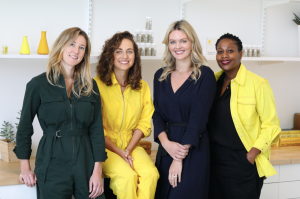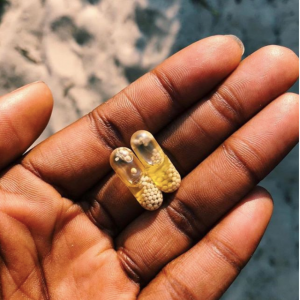This Founder Insists You Take Time Off After Having a Baby (Even Though She Didn’t)


Welcome to She Leads, a series digging into the good, the bad, and the ugly of being a woman in business. In each piece, we’ll chat with a different founder about her experiences, the issues women face in business, and how they’re powering through in the face of adversity.
Though vitamin company Ritual is all about women’s self-care, founder and CEO Katerina Schneider now admits she neglected her own during one of the most important times of her life, right after giving birth, in favor of the business. “I went back to work because we had some important launches coming up, but I actually wish I hadn’t,” she told From Day One.
Schneider’s decision at the time was heavily driven by the business culture around her. In the male-dominated worlds of tech and venture capital, the pressure is on and the tolerance for family planning is low to none. In fact, most of the hurdles she has faced while building her company have been around her pregnancy, from a VC blatantly discriminating against her to a demeaning experience at one of the industry’s most renowned conferences.
But despite all of this, Schneider has powered through and has learned from her negative experiences how to better the lives of her own employees and the landscape around business and family planning. At Ritual, which she founded in 2015, employees enjoy pregnancy accommodations that go far beyond what companies usually offer.
We chatted with Schneider to learn more about starting a family while in business. Excerpts:
You raised $40.5 million to date. The vast majority of VCs are men, so as a woman pitching a female-targeted company while also being pregnant, I’m sure that was no walk in the park. What was that experience like for you?

I was four months pregnant when we raised our first round, so my journey was a little bit different than than most. It was both kind of empowering and disempowering at the same time. The empowering part was that I quickly raised $1.3 million from really incredible VCs. With them, I was able to be really direct that I was pregnant from the initial conversation. It didn’t matter to them; they just believed in the vision.
But in one not-so-empowering conversation, the male VC paused and said, "You know, you have two choices. You can either start a company or you can have a family, but you can’t do both." And that was not so fun. That was disheartening. But it actually served as a catalyst for me to really take someone’s "no," get more aggressive, and propel forward.
A lot of women founders I’ve talked to say they have better experiences pitching and connecting with women investors. You’ve also partnered with a lot of women, so I was wondering if this has been your experience?
Yes and no, because I did feel that from the men who backed me as well. Brian Singerman from Founders Fund gave us our first check, and he’s definitely not a female. In my seed and also angel rounds, it was a good mix of both male and female investors. Today, our board is 75% women. I think the industry is really changing in terms of female VCs and the attitudes and everything, and I think I was part of that early, early wave. I got to see that, which is really inspiring.

That’s great—I love to see that happening. The last time we chatted was following TechCrunch Disrupt New York in 2016, where you were a finalist in the pitch competition but weren’t treated well as a new mom. The organizers wouldn’t provide a decent place for you to pump and ultimately stuck you on top of a broken escalator. A lot of time has passed and your company is flourishing, so how would you reflect on that experience today?
We’ve had employees who’ve had kids since then, and I’ve made it a really big part of my job and vision to create a work environment that is conducive to having families. We had a pump room in our office even when we were smaller, which is very important to me. We have really good paid maternity and paternity leave for our size, offering three months paid and one month unpaid with fully covered health benefits throughout. And now that we’re closer to 50 people, we’re reevaluating this policy to see what else we can offer. (Editor’s note: California mandates six weeks of paid leave for new parents). And we even have babies in the office at times.
Going through that really helped me realize the importance of that for employers, and I don’t know if I would’ve felt it as much had I not personally gone through it. (Twice now actually now; I’ve had two kids since launching Ritual). It changes your lens on what companies should offer their employees, what maternity leave should look like, and what people are actually going through during those times.
Additionally, we recently launched a prenatal vitamin, and this has influenced the marketing, messaging, and sensitivities around it. Most companies in our space are run by men, and it’s different when you’re really building a company and product for yourself and around experiences you already had. I’m so dedicated to creating the best possible product and the best ingredients but also the messaging and everything around it.
What advice would you give to other women founders, especially those navigating starting a family?

I encourage my team members to take time off after giving birth. We have good policies, but I personally as the CEO and founder have taken no time off. I went back to work after a week of having my second child and, in hindsight, I kind of regret it to be quite honest. I want women who have companies and families to take time with their new babies and bond, because you’re kind of in it for the long haul when it comes to your company. I think it’s important.
Also, I want them to know that you can do it all. I guess I’m a good example of that: we’ve raised over $40 million, I have a growing company, and I’m obsessed with my family, both my kids and my husband. It’s not easy and it takes work, but we women are capable of it all if that’s what we want.
What made you come to regret going back to work so soon after giving birth?
You know, I’ll never have the first couple weeks of giving birth back. I’ll never have that moment again. It’s something I thought I could prioritize the company over, but the company is still here and it will always be. I totally trust my team, and with a couple of weeks or even a month away, everything would’ve been fine. I’ve realized this as we scale, and I’ve grown to understand that self-care is important. So while I missed that, I now prioritize self-care in other ways and work out almost every single day even if it means taking time away from my kids and the company. You’re in it for the long haul. It’s not like some short stint.
This interview has been edited for length and clarity.
Sage Lazzaro is a NYC-based journalist covering diversity, inclusion, and social justice across tech, business, and politics. Her work has appeared in Refinery29, VICE, Medium, The New York Observer, and more. Follow her on Twitter here.
The From Day One Newsletter is a monthly roundup of articles, features, and editorials on innovative ways for companies to forge stronger relationships with their employees, customers, and communities.